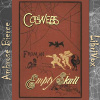Ambrose Bierce - In the Midst of Life; Tales of Soldiers and Civilians
Ambrose Bierce
100%
Speed
Horror & Supernatural Fiction
Historical Fiction
War & Military Fiction
Single Author Collections
770
Summary
These stories detail the lives of soldiers and civilians during the American Civil War. This is the 1909 edition. The 1909 edition omits six stories from the original 1891 edition; these six stories are added to this LibriVox recording (from an undated English edition). The 1891 edition is entitled In The Midst Of Life; Tales Of Soldiers And Civilians. The Wikipedia entry for the book uses the title Tales of Soldiers and Civilians. Ambrose Gwinnett Bierce (June 24, 1842 – after December 26, 1913) was an American editorialist, journalist, short story writer, fabulist and satirist. Today, he is best known for his short story, «An Occurrence at Owl Creek Bridge» and his satirical lexicon, The Devil's Dictionary. The sardonic view of human nature that informed his work – along with his vehemence as a critic, with his motto «nothing matters» – earned him the nickname «Bitter Bierce.» Despite his reputation as a searing critic, however, Bierce was known to encourage younger writers, including poet George Sterling and fiction writer W. C. Morrow. Bierce employed a distinctive style of writing, especially in his stories. This style often embraces an abrupt beginning, dark imagery, vague references to time, limited descriptions, the theme of war, and impossible events. In 1913, Bierce traveled to Mexico to gain a first-hand perspective on that country's ongoing revolution. While traveling with rebel troops, the elderly writer disappeared without a trace. Since the book is a compilation of short stories, there is not an overarching plot. However, there are literary elements, or plot devices, that are shared throughout. Bierce's stories often begin mid-plot, with relevant details withheld until the end, where the dramatic resolution unfolds differently than expected, to a degree where most are considered twist endings. His characters were described by George Sterling as: «His heroes, or rather victims, are lonely men, passing to unpredictable dooms, and hearing, from inaccessible crypts of space, the voices of unseen malevolencies.»… Bierce served as a union soldier during the Civil War and his experiences as a soldier served as an inspiration for his writing, particularly for the Soldiers section. In this way, Bierce's war treatments anticipate and parallel Ernest Hemingway's later arrival, whereas the civilian tales later influence horror writers. (Summary by Wikipedia and David Wales)
audiobooks.club
Horror & Supernatural Fiction
Ambrose Bierce
In the Midst of Life; Tales of Soldiers and Civilians
More from Ambrose Bierce
Authorization
By logging in, you agree to the terms and conditions.


















No comments